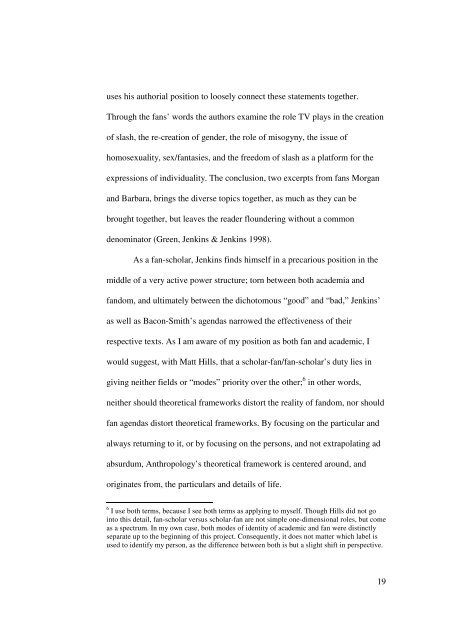Girls who like Boys who like Boys – Ethnography of ... - Yuuyami.com
Girls who like Boys who like Boys – Ethnography of ... - Yuuyami.com
Girls who like Boys who like Boys – Ethnography of ... - Yuuyami.com
You also want an ePaper? Increase the reach of your titles
YUMPU automatically turns print PDFs into web optimized ePapers that Google loves.
uses his authorial position to loosely connect these statements together.<br />
Through the fans’ words the authors examine the role TV plays in the creation<br />
<strong>of</strong> slash, the re-creation <strong>of</strong> gender, the role <strong>of</strong> misogyny, the issue <strong>of</strong><br />
homosexuality, sex/fantasies, and the freedom <strong>of</strong> slash as a platform for the<br />
expressions <strong>of</strong> individuality. The conclusion, two excerpts from fans Morgan<br />
and Barbara, brings the diverse topics together, as much as they can be<br />
brought together, but leaves the reader floundering without a <strong>com</strong>mon<br />
denominator (Green, Jenkins & Jenkins 1998).<br />
As a fan-scholar, Jenkins finds himself in a precarious position in the<br />
middle <strong>of</strong> a very active power structure; torn between both academia and<br />
fandom, and ultimately between the dichotomous “good” and “bad,” Jenkins’<br />
as well as Bacon-Smith’s agendas narrowed the effectiveness <strong>of</strong> their<br />
respective texts. As I am aware <strong>of</strong> my position as both fan and academic, I<br />
would suggest, with Matt Hills, that a scholar-fan/fan-scholar’s duty lies in<br />
giving neither fields or “modes” priority over the other; 6 in other words,<br />
neither should theoretical frameworks distort the reality <strong>of</strong> fandom, nor should<br />
fan agendas distort theoretical frameworks. By focusing on the particular and<br />
always returning to it, or by focusing on the persons, and not extrapolating ad<br />
absurdum, Anthropology’s theoretical framework is centered around, and<br />
originates from, the particulars and details <strong>of</strong> life.<br />
6 I use both terms, because I see both terms as applying to myself. Though Hills did not go<br />
into this detail, fan-scholar versus scholar-fan are not simple one-dimensional roles, but <strong>com</strong>e<br />
as a spectrum. In my own case, both modes <strong>of</strong> identity <strong>of</strong> academic and fan were distinctly<br />
separate up to the beginning <strong>of</strong> this project. Consequently, it does not matter which label is<br />
used to identify my person, as the difference between both is but a slight shift in perspective.<br />
19


